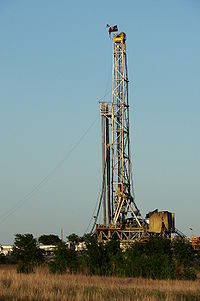
Photo from wikipedia
This article investigates the effects of hydraulic fracturing on infant health. The development of hydraulic fracturing (“fracking”) is considered the biggest change to the global energy production system in the… Click to show full abstract
This article investigates the effects of hydraulic fracturing on infant health. The development of hydraulic fracturing (“fracking”) is considered the biggest change to the global energy production system in the last half-century. However, several communities have banned fracking because of unresolved concerns about the impact of this process on human health. To evaluate the potential health impacts of fracking, we analyzed records of more than 1.1 million births in Pennsylvania from 2004 to 2013, comparing infants born to mothers living at different distances from active fracking sites and those born both before and after fracking was initiated at each site. We adjusted for fixed maternal determinants of infant health by comparing siblings who were and were not exposed to fracking sites in utero. We found evidence for negative health effects of in utero exposure to fracking sites within 3 km of a mother’s residence, with the largest health impacts seen for in utero exposure within 1 km of fracking sites. Negative health impacts include a greater incidence of low–birth weight babies as well as significant declines in average birth weight and in several other measures of infant health. There is little evidence for health effects at distances beyond 3 km, suggesting that health impacts of fracking are highly local. Informal estimates suggest that about 29,000 of the nearly 4 million annual U.S. births occur within 1 km of an active fracking site and that these births therefore may be at higher risk of poor birth outcomes.
Journal Title: Science Advances
Year Published: 2017
Link to full text (if available)
Share on Social Media: Sign Up to like & get
recommendations!